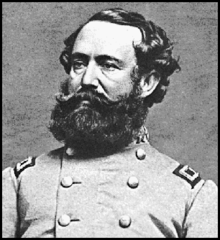Wade Hampton III
| Wade Hampton III | |
|---|---|

Wade Hampton during the Civil War
|
|
|
United States Senator from South Carolina |
|
|
In office March 4, 1879 – March 3, 1891 |
|
| Preceded by | John J. Patterson |
| Succeeded by | John L. M. Irby |
| 77th Governor of South Carolina | |
|
In office December 14, 1876 – February 26, 1879 |
|
| Lieutenant | William Dunlap Simpson |
| Preceded by | Daniel Henry Chamberlain |
| Succeeded by | William Dunlap Simpson |
| Member of the South Carolina Senate from Richland District | |
|
In office November 22, 1858 – October 8, 1861 |
|
| Preceded by | John Smith Preston |
| Succeeded by | Edward John Arthur |
| Member of the South Carolina House of Representatives from Richland District | |
|
In office November 22, 1852 – November 22, 1858 |
|
| Personal details | |
| Born |
March 28, 1818 Charleston, South Carolina |
| Died | April 11, 1902 (aged 84) Columbia, South Carolina |
| Political party | Democratic |
| Alma mater | South Carolina College |
| Profession | planter, soldier, politician |
| Committees | United States railroad commissioner 1893–1897 |
| Military service | |
| Allegiance |
|
| Service/branch |
|
| Years of service | 1861–1865 |
| Rank |
|
| Commands |
Hampton's Legion Cavalry Corps, Army of Northern Virginia |
| Battles/wars | American Civil War |
Wade Hampton III (March 28, 1818 – April 11, 1902) came from a wealthy planter family and shortly before the war was one of the largest slaveholders in the Southeast. He was elected to the state legislature. During the American Civil War, he served as a Confederate cavalry leader, reaching the rank of lieutenant general. In the postwar years, he returned to serve as a Democratic Party politician from South Carolina.
Near the end of the Reconstruction, Hampton was elected as 77th Governor of South Carolina, serving 1876-1879, and later was elected as a U.S. Senator. His campaign as governor was marked by extensive violence by the Red Shirts, a paramilitary group that served the Democratic Party by disrupting elections and suppressing black voting in the state. They contributed to the Democrats regaining control of the state government in this period.
Wade Hampton III was born in 1818 at 54 Hasell St. in Charleston, South Carolina, the eldest son of Wade Hampton II (1791–1858), known as "Colonel Wade Hampton", and Ann (née Fitzsimmons) Hampton. His mother was from a wealthy family in Charleston. After the War of 1812, his father had built his own fortune on land speculation in the Southeast. Together with owning extensive plantation lands in South Carolina and Mississippi, he was said to own the highest number of slaves in the South (more than 3,000).
The senior Hampton was an officer of dragoons in the War of 1812, and an aide to General Andrew Jackson at the Battle of New Orleans. The boy was the grandson of Wade Hampton (1754–1835), lieutenant colonel of cavalry in the American War of Independence, member of the U.S. House of Representatives, and brigadier general in the War of 1812. Wade III's uncle by marriage, James Henry Hammond, was elected to the U.S. House of Representatives and as Governor of South Carolina. In the late 1850s he was elected to the U.S. Senate.
...
Wikipedia
